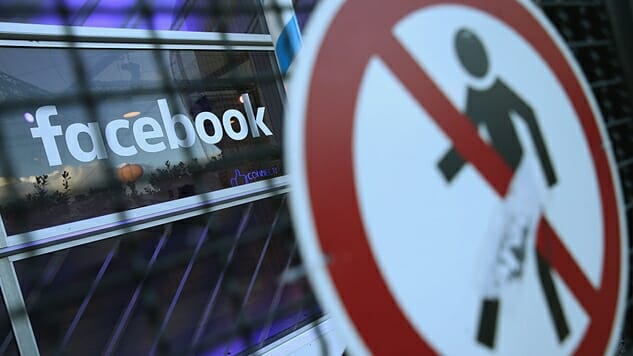The Latest Bombshell Proves Facebook Is a Stain on Society and It’s Time to Get Rid of It
Photo by Sean Gallup/Getty
Facebook is a garbage company run by a group of folks who clearly don’t care about their stated mission to connect people. Facebook is simply just the pure manifestation of greed in our digital age. The New York Times dropped another bombshell last night to reveal how corrupt these Silicon Valley slumlords are. Per the NYT:
For years, Facebook gave some of the world’s largest technology companies more intrusive access to users’ personal data than it has disclosed, effectively exempting those business partners from its usual privacy rules, according to internal records and interviews.
…
Facebook allowed Microsoft’s Bing search engine to see the names of virtually all Facebook users’ friends without consent, the records show, and gave Netflix and Spotify the ability to read Facebook users’ private messages.
…
“I don’t believe it is legitimate to enter into data-sharing partnerships where there is not prior informed consent from the user,” said Roger McNamee, an early investor in Facebook. “No one should trust Facebook until they change their business model.”
Here’s the part of the report where Facebook’s depravity becomes unimpeachable:
Facebook also allowed Spotify, Netflix and the Royal Bank of Canada to read, write and delete users’ private messages, and to see all participants on a thread — privileges that appeared to go beyond what the companies needed to integrate Facebook into their systems, the records show. Facebook acknowledged that it did not consider any of those three companies to be service providers. Spokespeople for Spotify and Netflix said those companies were unaware of the broad powers Facebook had granted them. A Royal Bank of Canada spokesman disputed that the bank had any such access.
Facebook’s excuse for all this?
Facebook is so vast that they don’t need your consent to sell your personal information. They effectively view the entire internet as their jurisdiction.
I.e., in this context, Bing or Spotify or a Russian search engine are effectively part of Facebook. They are delivering data to you — such as data about your friends — that you already could see on Facebook.
— Nick Confessore (@nickconfessore) December 19, 2018
On the other other hand, Facebook never asked your friends if they were cool with it. They argue that since your friends already shared that picture with you, they could show it to your friend through Bing.
— Nick Confessore (@nickconfessore) December 19, 2018
Quick Reminder: Zuckerberg Once Called People Who Trust Him With Their Data ‘Dumb F*cks’https://t.co/poxwkD8wGW
— Dylan Byers (@DylanByers) December 19, 2018
In retrospect, I don’t think we made enough of the fact that the 4 founders of WhatsApp and Instagram all left Facebook this year, and two of them gave up $1.3 billion rather than wait out their contracts. https://t.co/bPWzsacGZ3
— Kevin Roose (@kevinroose) December 19, 2018
GENIUS ALERT: Check out the new Thomas Edison Mark Zuckerberg and his inspired big new idea no one else would’ve ever thought of: “a place to look at girls and see if they’re single”
— Mark Agee (@MarkAgee) December 19, 2018
After Facebook’s scandal last month (there’s so many at this point it’s impossible to keep track of them all), I wrote that it’s time for all of us to delete Facebook, but Slate‘s April Glaser’s piece precipitated by March’s Facebook scandal highlights how that can be a privileged position, and focusing solely on consumer choices won’t fix the problem:
People are mad at Facebook, and they should be. The company allowed thousands of app developers to extract their data through time-sucking games and pointless online quizzes. And now, thanks to a whistleblower and two stunning reports in the Observer and the New York Times, we know that one of those developers siphoned data on more than 50 million Facebook users and shared them with the Trump campaign’s voter targeting firm, Cambridge Analytica—a company that has bragged it has psychological profiles on 230 million American voters, which it uses to target people online with emotionally precise digital messaging to influence elections. This was the trade-off for logging in to see baby photos?
…
Unlike broadcast television and radio, which are also free for the price of having to endure ads, on Facebook you can’t change the channel. If you leave Facebook—which is where your friends, scene, and community already is—you’re alone, because for many people, Facebook is becoming the internet and the internet is becoming Facebook. Your business could have trouble reaching customers; your family might not gather on another social network; no one posts any events anywhere else. All of which means that leaving Facebook simply doesn’t make sense for many people. It’s a network effect, a kind of natural monopoly; migrating to another social network would only work if enough people migrate there, too. In other words, if you want to be a part of any social life or local political conversations or want to promote your work, that simply means being on Facebook.
Facebook has made it practically impossible to run a business without using their service. For social media managers, you basically cannot run your business’ page without a personal Facebook account. Their success in becoming the largest social network on the internet has completely insulated them from having to face any tangible consumer backlash. People have spent years cultivating followings on Facebook, and even if they are deeply disturbed by the constant revelations that Facebook is spying on them and selling that information to the highest bidder, leaving that network would be detrimental to their business or community.
This is what a monopoly looks like.
So let’s go after Facebook. We have this thing called the federal government and they have a lot of power to not only subpoena Facebook’s feckless, spineless leadership and force them to answer for their sins in front of the entire country, but to also forcibly rein in their corruption. Given the tweets of one senator last night, some momentum seems to be gaining around this topic.
It has never been more clear. We need a federal privacy law. They are never going to volunteer to do the right thing. The FTC needs to be empowered to oversee big tech.
— Brian Schatz (@brianschatz) December 19, 2018
The silence from Facebook is deafening. The New York Times has a story that says that PRIVATE MESSAGES were accessible to a bank in Canada and Netflix? I’m trying to be measured and precise with my words here. But I’m a customer as well as a Senator and I’m angry in both roles.
— Brian Schatz (@brianschatz) December 19, 2018
Facebook played a central role in the Rohingya genocide in Myanmar. They let Cambridge Analytica siphon off millions of user profiles in order to influence elections in both the United States and England. Their Jewish CEO and COO spread anti-Semitic conspiracy theories about George Soros in order to deflect attention away from their fundamentally broken product. In many ways, Facebook is simply a reflection of our modern dystopia, run by the same kind of cowardice that we witness in our political realm each day. If you can, delete your personal Facebook, like many major reporters have in the wake of this latest report.
I’m out. @facebookpic.twitter.com/U9LXC3D1Zj
— Kasie Hunt (@kasie) December 19, 2018
But given how many people cannot afford to delete their Facebook, we must stand up and collectively push back against this monopoly that deploys NSA-like spying powers in the name of crony capitalism. Call your congressperson and tell them to enforce existing anti-monopoly laws against one of the most obvious monopolies in the world today—or at least tell them to call Mark Zuckerberg and Sheryl Sandberg to testify in Washington D.C. for a good old fashioned public flogging. If we cannot personally delete Facebook, we should do so collectively, and purge this digital scourge from the Earth.
UPDATE: A day after publishing this story, a spokesperson from Netflix reached out and requested that we publish the following statement:
Over the years we have tried various ways to make Netflix more social. One example of this was a feature we launched in 2014 that enabled members to recommend TV shows and movies to their Facebook friends via Messenger or Netflix. It was never that popular so we shut the feature down in 2015. At no time did we access people’s private messages on Facebook, or ask for the ability to do so.
Jacob Weindling is a staff writer for Paste politics. Follow him on Twitter at @Jakeweindling.







































